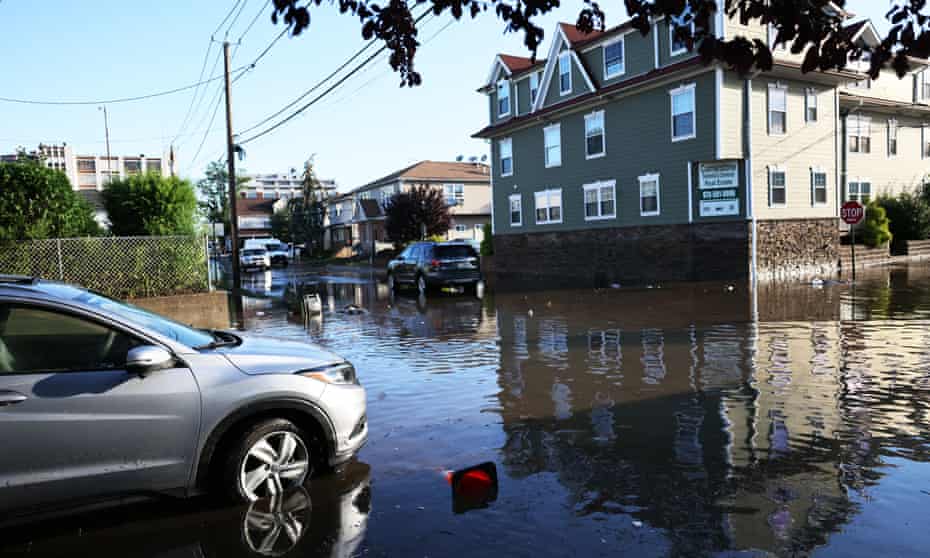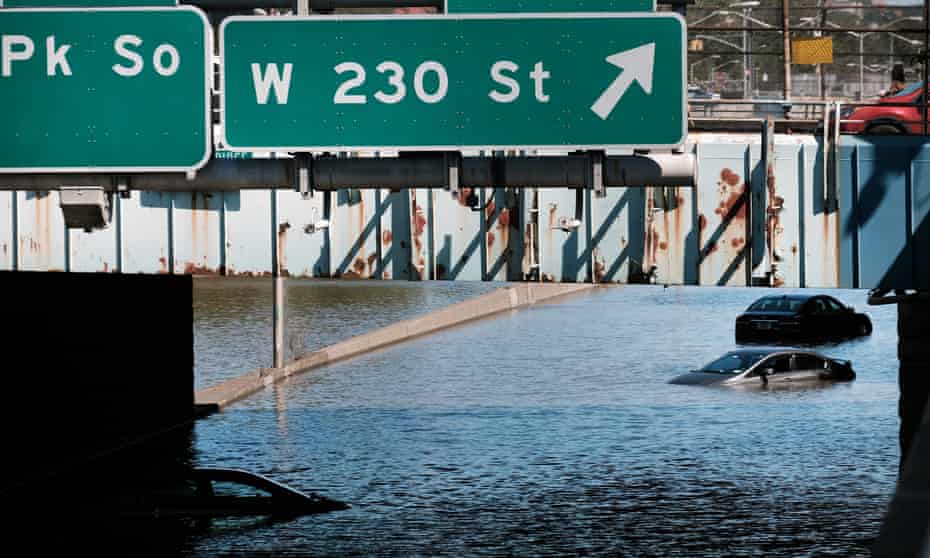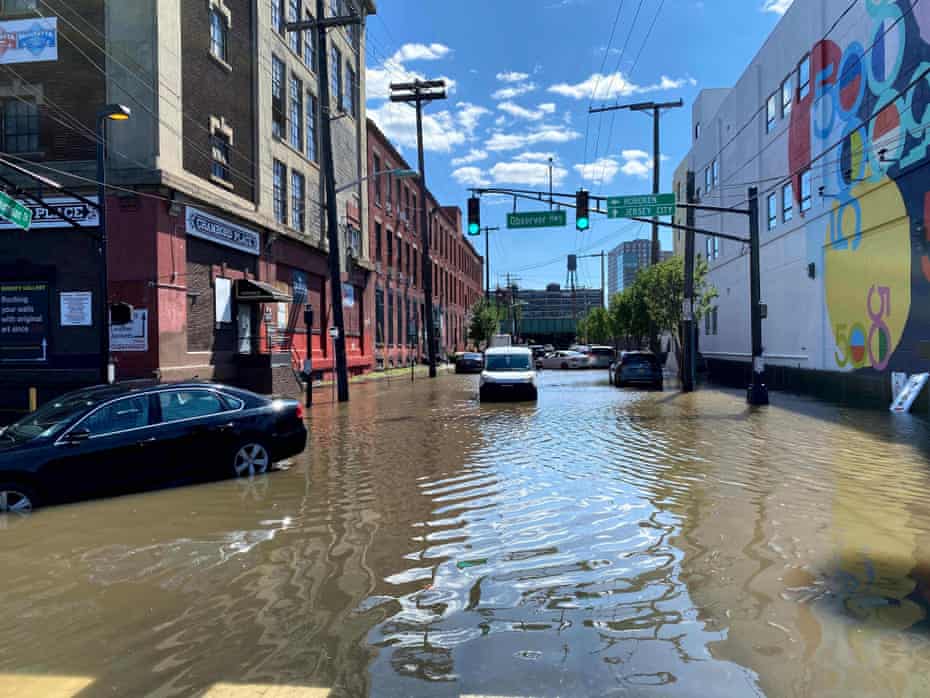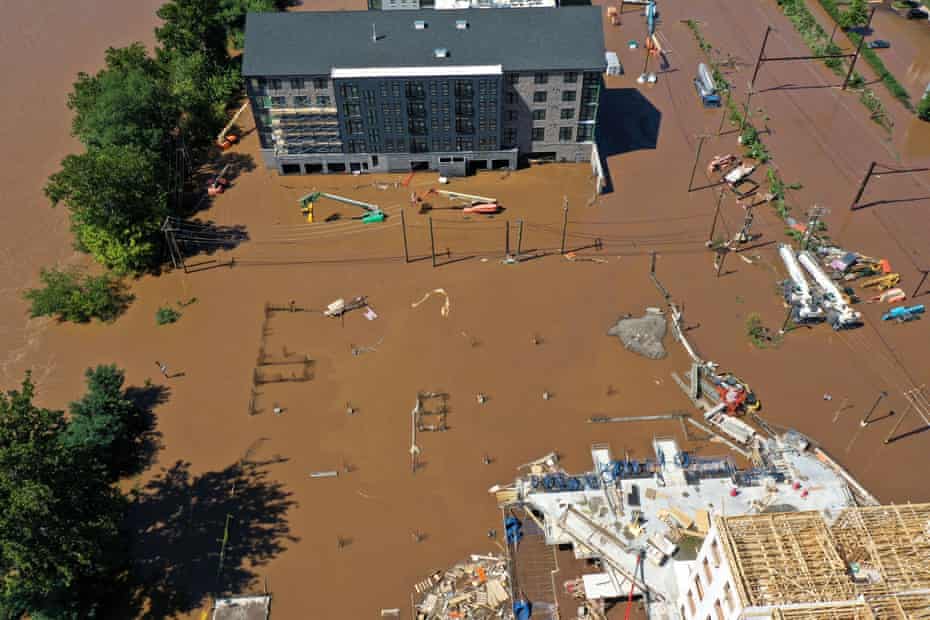Death toll rises in US north-east after sudden heavy rains and flooding

Deaths and damage spanned huge areas in New York, New Jersey, Pennsylvania, Connecticut and Maryland
First published on Thu 2 Sep 2021 12.39 EDT
Police were going door to door in search of more possible victims and drawing up lists of the missing in the US north-east on Friday, as the death toll rose to 49 across eight states in the region after the catastrophic flooding set off by the remnants of Hurricane Ida after it roared up from Gulf coast.
Ida struck Louisiana last Sunday, knocking out power to the city of New Orleans and causing deaths in that state and Mississippi.
The National Hurricane Center had warned since Tuesday of the potential for “significant and life-threatening flash flooding” and major river flooding in the mid-Atlantic and New England.
The storm struck the region on Wednesday night and officials in New York admitted they had not expected the swift devastation that followed, as record rainfall and battering winds hit the city, amid a tornado warning, in the space of a terrifying hour or so after dark.
The disaster underscored with stunning clarity how vulnerable the US is to the extreme weather that the human-caused climate crisis is bringing. In its wake, officials weighed far-reaching new measures to save lives in future storms and Joe Biden warned from the White House that climate change “is here”.
New York’s new governor, Kathy Hochul, and the New York City mayor, Bill de Blasio, said the storm took them by surprise.
“We did not know that between 8.50pm and 9.50pm last night the heavens would literally open up and bring Niagara Falls-level of water to the streets of New York,” said Hochul.
De Blasio said he had a forecast on Wednesday of 3in to 6in (7.6-15cm) of rain over the course of the day. Central Park ended up getting 3.15in in one hour, surpassing the previous recorded high of 1.94in in an hour – recorded during Tropical Storm Henri on 21 August.
Many people drowned in their cars or in basement apartments and there were hundreds of rescues by boat and with first responders wading and climbing to the rescue in dangerous conditions.
Late on Thursday afternoon, after a day of rescue work and disruption to transportation and power, the governor of New Jersey, Phil Murphy, said he was “saddened to report that, as of right now, at least 23 New Jerseyans have lost their life to this storm.

“The majority of these deaths were individuals who got caught in their vehicles by flooding and were overtaken by the water. Our prayers are with their family members.”
On Friday, communities labored to haul away ruined vehicles, pump out homes and highways, clear away muck and other debris, restore mass transit and make sure everyone caught in the storm was accounted for.
Even after clouds gave way to blue skies, some rivers and streams were still rising. Part of the swollen Passaic River in New Jersey was not expected to crest until Friday night.
“People think it’s beautiful out, which it is, that this thing’s behind us and we can go back to business as usual, and we’re not there yet,” Murphy warned.
In New York City, police said at least 13 people died, one in a car and 11 in flooded basement apartments that often serve as relatively affordable homes in one of the nation’s most expensive housing markets. Westchester county, a northern suburb of New York, reported three deaths.
Officials said at least five people died in Pennsylvania, including one killed by a falling tree and another who drowned in his car after helping his wife to escape.
In Connecticut, a state police sergeant perished after his cruiser was swept away. A 19-year-old man was killed in flooding at an apartment complex in Rockville, Maryland, police said.
In a speech at the White House in Washington on Thursday, Joe Biden said: “These extreme storms, and the climate crisis, are here. We must be better prepared. We need to act.”

Highways flooded, garbage bobbed in streaming streets and water cascaded into subway tunnels, trapping at least 17 trains and halting service until early morning. Videos online showed riders standing on seats in swamped cars. All riders were evacuated safely, officials said.
Harrowing reports were common. In Queens, water filled the sunken patio of one basement apartment then broke a glass door, trapping a 48-year-old woman in 6ft of water. Neighbours tried in vain to save her.
“She was screaming, ‘Help me, help me, help me!'” said the building’s assistant superintendent, Jayson Jordan. “We all came to her aid, trying to get her out. But it was so strong – the thrust of the water was so strong.”
A two-year-old boy was among the dead in Queens, where officers said they found three bodies around noon in a flooded basement near Kissena Park. Three other people, including two women and a man, were found dead on Thursday morning in a basement apartment in another part of the borough.
28th St & 7 Ave subway station (Chelsea, Manhattan) pic.twitter.com/2q4UQRIhm0
— Christiaan Triebert (@trbrtc)
The storm ultimately dumped more than 9in of rain in parts of New Jersey, Pennsylvania, Massachusetts and Rhode Island, and nearly as much on Staten Island in New York City.
Newark international airport shut down on Wednesday night as videos showed water rushing through a terminal. The airport allowed limited flights on Thursday.

“There’s a lot of hurt in New Jersey,” Governor Murphy told ABC, discussing havoc caused by flooding in the north and tornadoes in the south.
Major flooding along the Schuylkill River in Pennsylvania swamped highways, submerged cars and disrupted rail service. Amtrak service was affected between Philadelphia and Boston, as was New Jersey Transit train service.
New York’s resilience to flooding was under renewed scrutiny. It was the second time in recent weeks that subway stations and streets were submerged.